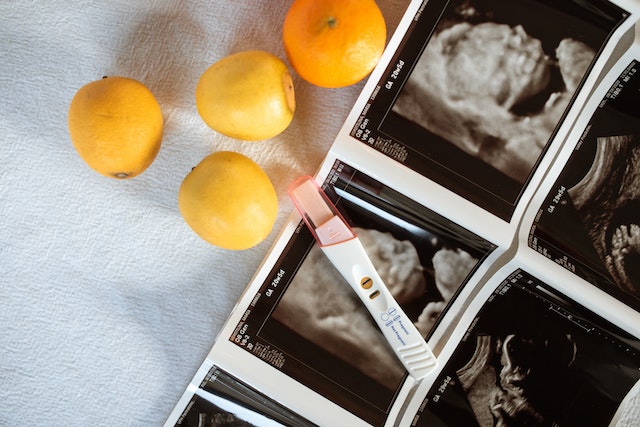A CVS pregnancy test stands for Chorionic villus sampling test. It is done to find out any genetic problems in the developing foetus. This testing is usually done in 10 to 13 weeks of pregnancy. The test causes minimal discomfort and no pain. You should talk to your doctor and then decide whether you want to undergo CVS testing or not.
Moreover, here is all about CVS pregnancy test instructions and procedures to help you know what doctors will be testing and how. You will come to know about amniocentesis too and how it differs from CVS testing. This will help you make informed and wise decisions for your developing baby.
What does Chorionic villus sampling (CVS) mean?
Chorionic villus sampling is basically like prenatal genetic testing. This CVS pregnancy test is done to know the health condition of the baby. It identifies any Down syndrome-type condition in the baby. It also determines the gender of the baby in the mother’s womb. CVS pregnancy test takes a small sample of placenta cells to identify the genetic characteristics of the baby.
The placenta is the organ that forms inside the mother’s body during pregnancy and gets connected to the foetus to deliver food and nourishment. The doctors generally follow the CVS pregnancy test instructions and remove the cells named chorionic villi, which are formed from the fertilised eggs. These removed cells help the doctors to determine the genes of the foetus as they carry the same genetic characteristics as that of the foetus.
CVS testing Vs Amniocentesis:
Though common people may not find differences between CVS testing and Amniocentesis, there remains a big difference between these two. Both of them are a type of prenatal diagnostic testing. But both of them are done at different phases of pregnancy.
- CVS testing is done at the early stage at around 10 to 13 weeks of pregnancy. While Amniocentesis is done after the gestation period which is 15 weeks later.
Apart from this, the aim of both the testing is different from one another.
- A CVS pregnancy test is done to identify the genetic features of the baby while Amniocentesis is done to determine any defects like spina bifida in the neural tube, which grows and turns into the baby’s brain and spinal cord. Whereas, cvs cannot detect these things.
Therefore, you should talk to your doctor and get this CVS pregnancy test done to ensure everything is fine with your baby.
Who can get CVS testing done?
A CVS pregnancy test is generally done by doctors based on certain risk factors, abnormal genetic screening or on detection of any abnormalities. This test is done for to following reasons:-
- If any abnormal genetic condition is detected.
- If the mother’s age is 35+. With the increase in age, the risk of having a baby with genetic disorders also increases.
- If any previous test shows genetic risks in the foetus.
- If there is any family history of genetic disorders.
What types of diseases can be identified by CVS?
Problems related to chromosomes and DNA are mostly detected through CVS pregnancy test instructions from doctors. If there are any missing chromosomes or any abnormal change in the DNA of the foetus, the CVS pregnancy test identifies it. These problems or diseases include:
- Cystic fibrosis
- Tay-Sachs disease
- Down syndrome
- Trisomy 21, 18
- Edward syndrome
Can any type of birth defect be detected by CVS testing?
Some defects are not identified by a CVS pregnancy test. For example, heart problems, cleft lip, spina bifida, or palate. Mainly, an ultrasound at 18-20 weeks of pregnancy shows these birth defects. You can also consider the Alpha-fetoprotein (AFP) test to detect any neural tube disorders which are left in the faint line CVS pregnancy test.
Why is the CVS test important?
Following are some of the benefits of having a CVS pregnancy test.
- Accurate results: This test shows the accurate data which ultimately derives better decisions and results.
- Significant information: If there is any defect in the baby, you will require the information as soon as possible. So that you can prepare for the treatment of the baby after birth or may decide to discontinue the pregnancy.
- Prevents future complications: Early knowledge of any defect can help you be prepared for preventive or even termination processes. This faint-line CVS pregnancy test prevents any future complications.
How does the CVS pregnancy test work?
The CVS test is not that painful but yes you can feel a little discomfort. There are two ways doctors perform CVS tests.
Transcervical:
This test is done through the vaginal route. The doctor inserts a speculum and a device known as a duck’s bill into the vagina. This device widens the vaginal walls. Then, a thin plastic tube is inserted into the cervix given ultrasound. This tube is then moved and a small sample is removed from the villi.
Transabdominal:
The same process of CVS pregnancy test instructions is done under the view of ultrasound. A thin needle is inserted through the abdomen to the placenta to remove the sample cell. In this process, doctors may use anaesthesia drugs to minimise the discomfort.
Is there any risk associated with CVS testing?
With the CVS pregnancy test, there is little risk of marriage associated. Out of 300 or 500, 1 or 3 cases face miscarriage due to CVS testing. Another risk can be an infection. Due to the insertion of different tools, there may be a risk of infection that may cause baby deformities. However, this testing is safe to carry and doesn’t involve any severe risk.
The bottom line:
After getting tested with a faint line CVS pregnancy test, you will get the result within 10 days of testing. You should opt for CVS testing after contacting your doctor and if you are facing symptoms like amniotic fluid leaking, chills, fever, or contractions.
And if you are having vaginal bleeding during pregnancy or having infections do not go for cvs testing. The test shows 99% accurate results but may not be able to detect some of the conditions in the baby. It is a safe test and does not cause any harm to the baby.










